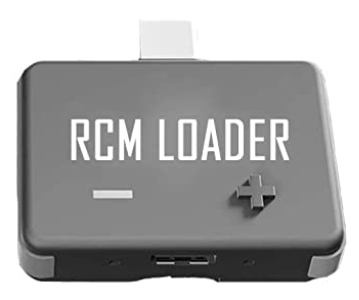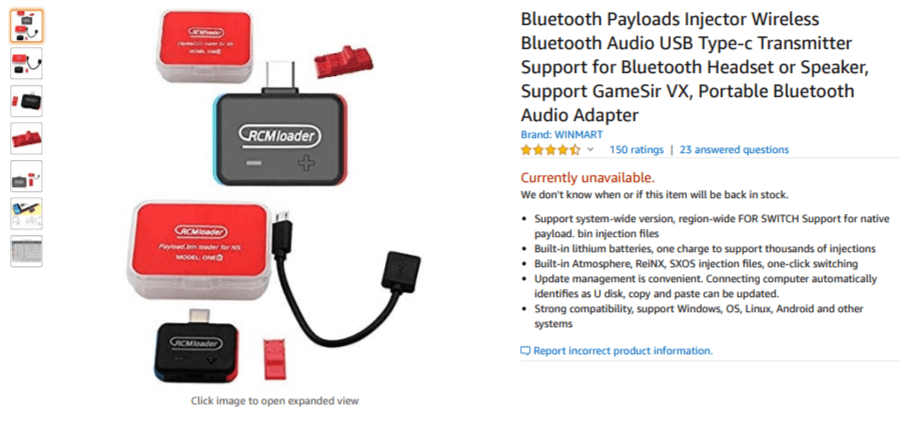-
chevron_right
Nintendo Wins US-Wide Injunction Against Seller of RCM Loader ‘Piracy’ Device
Andy Maxwell · news.movim.eu / TorrentFreak · Friday, 16 April, 2021 - 20:19 · 4 minutes
 Nintendo is currently engaged in a war of attrition against individuals and groups who help people to pirate and play unlicensed Switch games.
Nintendo is currently engaged in a war of attrition against individuals and groups who help people to pirate and play unlicensed Switch games.
Products and individuals involved with the infamous Team-Xecutor became targets last summer and alongside, Nintendo has been chipping away at other sellers of similar circumvention devices.
Lawsuit Filed Against Amazon Vendor
Last November, Nintendo filed a lawsuit against Le Hoang Minh, an Amazon vendor doing business under the name ‘Winmart’. According to the gaming giant, the trader was selling RCM Loader, a Switch device marketed as a plug-and-play solution for injecting payload files to allow booting into custom firmware (CFW), including Team-Xecutor’s SX OS.
“Once this circumvention has occurred, the unauthorized CFW modifies the authorized Nintendo Switch operating system, thereby allowing users to obtain and play virtually any pirated game made for the Nintendo Switch. All of this happens without authorization or compensation to Nintendo or to any authorized game publishers,” the company explained.
Le Hoang Minh, who according to Nintendo is a resident of Vietnam, was sent a DMCA notice by Nintendo via Amazon, citing the anti-circumvention provisions of the DMCA. As a result, a specific listing was taken down by Amazon but the defendant subsequently filed a counternotice stating that Nintendo had made an error. As a result, the listing was restored.
In its lawsuit, Amazon claimed that Le Hoang Minh was not only a seller of RCM Loader devices but also the manufacturer too, going on to demand the maximum statutory damages available under the DMCA and a broad injunction preventing any future sales. Nintendo also demanded relief for the defendant’s alleged abuse of the DMCA’s counternotification system.
Defendant Fails to Respond, Nintendo Moves For Default
In a motion for default judgment filed this week, Nintendo says that it filed its lawsuit in response to the defendant’s counternotice, in order to keep the Amazon listing down. However, the defendant failed to respond to the lawsuit or enter into discussions with Nintendo.
As a result, Nintendo demanded a default judgment on each of its claims, arguing that since the defendant is in Vietnam, only a ruling from a US court would allow it to prevent sales of RCM Loader taking place in the United States.
To promote what Nintendo describes as “an efficient resolution” of the matter, the gaming giant reduced its damages claims to just $2,500 for all actions carried out by the defendant in breach of the anti-trafficking provisions of the DMCA.
“This request for a $2,500 award is intended to be very conservative and does not reflect anything close to the full amount of damages Nintendo could reasonably seek from Defendant,” the company writes.
“Nintendo could…credibly seek a separate award for every device Defendant sold — almost certainly many devices, given that Defendant’s RCM Loader device was available online for many months. However, rather than attempt to quantify Defendant’s total sales, Nintendo seeks to facilitate an efficient resolution of this case through entry of judgment awarding damages for a single § 1201 violation.”
Nintendo also informed the court that it had incurred considerable costs pursuing the case but was not seeking to have those reimbursed. However, the company still demanded a judgment in its favor in respect of the DMCA violations, the misrepresentations made by the defendant in his DMCA counternotice, and the request for a permanent injunction.
Court Sides With Nintendo
After considering Nintendo’s motion for default, the court ruled that should be granted. In a final judgment issued Thursday, the court laid down the terms.
A permanent injunction was granted against Le Hoang Minh and all other individuals and entities acting in concert, restraining all from circumventing or assisting in circumventing any technological security measures that effectively control access to Nintendo’s copyrighted works.
The same are also restrained from manufacturing, offering for sale, distributing, exporting or otherwise trafficking into the United States “any and all products, services, devices, components or parts thereof” that are designed or produced for circumventing security measures in Nintendo’s consoles, products and protected works.
Turning to RCM Loader and any product with identical function, the court restrained the defendant from carrying out sales, distribution, imports and/or shipping to any person or entity in the United States. Le Hoang Minh is also banned from indirectly infringing, facilitating, encouraging, promoting or inducing the infringement of Nintendo’s copyrights, whether in existence now or in the future.
In an effort to prevent sales on platforms such as Amazon, the defendant was restrained from offering RCM Loader or any similar product for sale or distribution. Any seller or online marketplace who receives notice of the order must also “immediately cease and permanently refrain” from offering any such products in the United States.
The court also authorized Nintendo to seize and destroy all circumvention devices and software that violate its copyrights or exclusive licenses. It further granted the $2,500 in statutory damages requested by Nintendo and reminded the defendant that any violation of the order may be punishable as contempt of court.
Nintendo’s Motion for Default Judgment can be found here (pdf)
The Final Judgment and Permanent Injunction can be found here (pdf)
From: TF , for the latest news on copyright battles, piracy and more.

